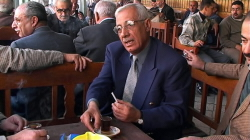Stuart:
Filmed in the month before, and for sometime after the US-lead invasion of Iraq, In the Shadow of the Palms promises to be a previously unseen glimpse into Iraq. Wayne Coles-Janess’ film strives to show the everyday lives of ordinary Iraqis, from the most menial of daily duties to political rallies and private debates between citizens on the USA’s intentions. Coles-Janess only appears briefly (and this moment seems a little out of place) in the 90 minute doco, which has no narration and only a smattering of title cards.
 Without being as shamelessly emotive as Michael Moore (remember the footage of kids playing soccer in the day before the invasion in Fahrenheit 9/11?), a theme does begin to appear in Coles-Janess’ documentary. A lot of (or as this film would have it, all) Iraqis don’t want the US meddling in their country. It’s a powerful point of view that is often overlooked in the western media coverage I’ve seen, and In the Shadow of the Palms certainly works as a counter-narrative to the stuff we’ve been fed for years now.
Without being as shamelessly emotive as Michael Moore (remember the footage of kids playing soccer in the day before the invasion in Fahrenheit 9/11?), a theme does begin to appear in Coles-Janess’ documentary. A lot of (or as this film would have it, all) Iraqis don’t want the US meddling in their country. It’s a powerful point of view that is often overlooked in the western media coverage I’ve seen, and In the Shadow of the Palms certainly works as a counter-narrative to the stuff we’ve been fed for years now.
Unfortunately, even with some astoundingly powerful images, the film fails overall. At times patchy, the footage isn’t ever put to good use, with an almost complete lack of narrative failing to drive us toward a definite conclusion. Sure, most of the footage is in chronological order, but this alone isn’t enough. Opening with images of US forces gunning down injured people attempting to crawl to safety, the film seems to start out taking sides, but then awkwardly eschews any moral commentary later on. Late in the piece we have title cards detailing Coles-Janess’ own experiences, from his footage succumbing to water damage, to being interrogated and being arrested multiple times. Even stranger, we spend a short time with US forces on patrol in Iraq, which again only serves to confuse the aim of the film. Whose story is this?
Coles-Janess has done an extraordinary job obtaining the fantastic footage on display, but perhaps it may have been better if someone else had been brought on board to compile it all. The finished production is rather patchy – some brilliantly effective moments marred by several tedious and seemingly aimless sequences. The title cards are frustratingly amateurish and the subtitles rife with spelling mistakes. As a historical document it stands up, but as an engaging documentary it unfortunately fails, which is a pity because stories from the ‘other side’ need to be heard, particularly when the mainstream media are constantly doing their best to ignore them.
Rating: